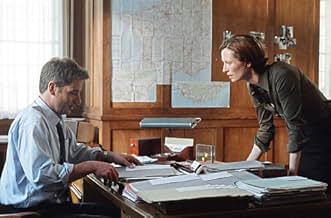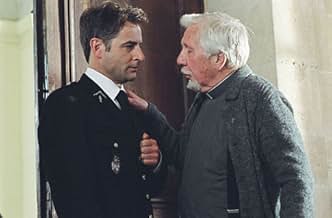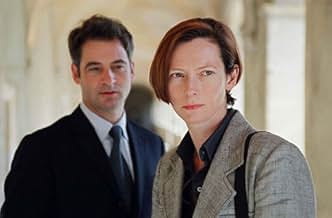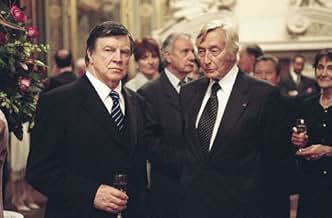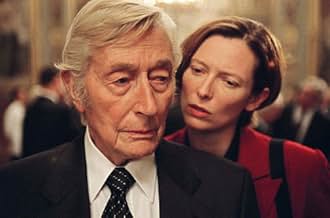IMDb-BEWERTUNG
6,2/10
5728
IHRE BEWERTUNG
Die Geschichte eines ehemaligen Nazi-Henkers, der zur Zielscheibe von Auftragskillern und Polizeiermittlern wird.Die Geschichte eines ehemaligen Nazi-Henkers, der zur Zielscheibe von Auftragskillern und Polizeiermittlern wird.Die Geschichte eines ehemaligen Nazi-Henkers, der zur Zielscheibe von Auftragskillern und Polizeiermittlern wird.
- Regie
- Drehbuch
- Hauptbesetzung
- Auszeichnungen
- 4 wins total
David de Keyser
- Dom André
- (as David De Keyser)
Empfohlene Bewertungen
After France fell to Germany in 1940 , the Vichy regime was set up under Marshal Petain . In 1943 , the Vichy government created a military force called Milice to carry out the Nazi occupiers . When the war was over many of those involved were prosecuted for war crimes . Some get away . A few rose to power . Pierre Brossard ( Michael Caine ) committed crimes against humanity and collaborated with Nazis in WWII . Today Pierre follows hidden by priests of Catholic Church that sheltered him during fifty years and is being protected by a strange sect called The Chevaliers of St. Marie . But a judge ( Tilda Swinton ) and a colonel ( Jeremy Northam ) are investigating his past . Meanwhile , a mysterious murderous ( Matt Craven) is pursuing Pierre to kill him .
This TV movie produced by Canadian television in association with BBC packs suspense , mystery , thrills , action and is quite entertaining . Jewison cast some largely known actors as Michael Caine , his wife well played by Charlote Rampling , the starring duo as Tilda Swinton and Jeremy Northam , and a remarkable support cast as Ciaran Hinds as Inspector Pochon , Alan Bates as Bertier , Frank Finlay as the Comissaire and several others . Atmospheric musical score by Norman Corbeil and appropriate cinematography by Kevin Jewison , director's son . The motion picture is professionally produced and directed by Norman Jewison . He is a prestigious and veteran filmmaker, his greatest film is of course Jesus Christ Superstar . He considers The Hurricane (1999) the last in a trilogy of racial bigotry movies he's realized, the first two being In the Heat of the Night (1967) and A Soldier's Story (1984).
The film terminates with an epilogue based on real events , that says the following : ¨At 5:00 am , on June 29, 1944, in Rilleux -La-Pape, France, seven Jews were executed ¨. The movie is dedicated to those seven men and the 77.000 other French Jews who perished under German occupation and the Vichy regime .
This TV movie produced by Canadian television in association with BBC packs suspense , mystery , thrills , action and is quite entertaining . Jewison cast some largely known actors as Michael Caine , his wife well played by Charlote Rampling , the starring duo as Tilda Swinton and Jeremy Northam , and a remarkable support cast as Ciaran Hinds as Inspector Pochon , Alan Bates as Bertier , Frank Finlay as the Comissaire and several others . Atmospheric musical score by Norman Corbeil and appropriate cinematography by Kevin Jewison , director's son . The motion picture is professionally produced and directed by Norman Jewison . He is a prestigious and veteran filmmaker, his greatest film is of course Jesus Christ Superstar . He considers The Hurricane (1999) the last in a trilogy of racial bigotry movies he's realized, the first two being In the Heat of the Night (1967) and A Soldier's Story (1984).
The film terminates with an epilogue based on real events , that says the following : ¨At 5:00 am , on June 29, 1944, in Rilleux -La-Pape, France, seven Jews were executed ¨. The movie is dedicated to those seven men and the 77.000 other French Jews who perished under German occupation and the Vichy regime .
What I have to say is first a repetition of what most of the users have already pointed out:Michael Caine is an exceptional actor;even when the character is a b..... ,he almost makes us side with him.A collaborator in occupied France during WW2,he was responsible for the death of seven Jews and he was never punished for what he had done.Pierre Brossard puts his trust in God,and he's always praying Saint-Christopher and begging absolution from his crimes.Outside Caine,best performance comes from Charlotte Rampling ,who,as always,makes the best of an underwritten part.
But the screenplay is a novel transferred to the screen ,and it's a NOVEL.There are as many holes in the plot as in Swiss cheese.The judge (a woman of course)and the military man are cardboard characters (but we are spared the love affair between them,just for that,M.Jewison,thank you!!!),and actually we could easily do without them.One of the judge's uncles is a minister/secretary,no less! It's true that fundamentalist Christians have a tendency to support the far right.But making so many abbeys of the South of France a shelter for people like Brossard ,demands such an imagination...It seems that every priest, every monk and every nun of my country are here to protect those who killed the Jews !One often forgets that there are many of them who helped and saved children during those darker days of French history.
I have not read the book but I do not feel like doing it.A movie was made in the eighties about Beate Klarsfeld (TV).People complained because they chose Farah Fawcett to portray her ,but at least it was based on accurate historical facts (Klaus Barbie).
But the screenplay is a novel transferred to the screen ,and it's a NOVEL.There are as many holes in the plot as in Swiss cheese.The judge (a woman of course)and the military man are cardboard characters (but we are spared the love affair between them,just for that,M.Jewison,thank you!!!),and actually we could easily do without them.One of the judge's uncles is a minister/secretary,no less! It's true that fundamentalist Christians have a tendency to support the far right.But making so many abbeys of the South of France a shelter for people like Brossard ,demands such an imagination...It seems that every priest, every monk and every nun of my country are here to protect those who killed the Jews !One often forgets that there are many of them who helped and saved children during those darker days of French history.
I have not read the book but I do not feel like doing it.A movie was made in the eighties about Beate Klarsfeld (TV).People complained because they chose Farah Fawcett to portray her ,but at least it was based on accurate historical facts (Klaus Barbie).
In Norman Jewison's tepid thriller, `The Statement,' English-accented Michael Caine plays Pierre Brossard, an aging French war criminal whose past has begun to catch up with him. In 1944, Brossard, a member of the infamous Vichy regime, not only collaborated with the Nazis, but was personally responsible for the cold-blooded execution of 14 unarmed Jewish Frenchmen as well. Immediately after the war, Brossard was tried and convicted for these offenses, but somehow managed to escape before he could face his deserved punishment. In the years since, Brossard has lived his life underground, finding protection and sanctuary from a branch of the Roman Catholic Church sympathetic to his cause. And although the French authorities have been unsuccessful in their attempts to locate him, Brossard has recently found himself the target of a mysterious group of assassins, possibly members of a secret Jewish organization seeking justice for his yet unavenged crimes against humanity.
The idea of a Nazi war criminal still living in hiding all these years after the end of World War II has the makings of an interesting movie, no doubt, but `The Statement' is not that movie. To the filmmakers' credit, they do at least attempt to present Brossard as a three-dimensional character, a man who, decades after his horrendous crimes, is still seeking redemption through his pious devotion to the Church. Caine, in a deftly balanced performance, manages to make Brossard almost sympathetic while still allowing us to see the `monster' hidden beneath the ravaged soul. Unfortunately, the actor is let down by a screenplay that seems more concerned with tired cloak-and-dagger espionage routines than with a serious study of a fascinating and conflicted character. Even more annoying is the attempt on the part of the film to paint the entire Catholic Church hierarchy as a bunch of diabolical, self-serving individuals who are busy either protecting one of their own at any or all costs or acting out of political expediency rather than true moral conviction. Fans of `The Da Vinci Code' may swallow this anti-Catholic paranoia without question, but the rest of us can merely wonder why the Church hasn't been able to cop a break from the movies since Father Damien kicked the be-Jesus out of the devil in `The Exorcist,' thirty long years ago. I'm certainly no apologist for the Catholic Church (see my review of `The Magdalene Sisters'), but even we non-believers can wonder when we will be seeing a little more evenhandedness and balance in the movies' portrayal of the Church. Certainly there must be SOME well-meaning priest, nun or bishop out there that some filmmaker might consider as worthwhile movie material.
There are other problems with the film as well. Tilda Swinton, as an impassioned judge searching for Brossard, and Jeremy Northam, as a more pragmatic policeman who reluctantly joins her in her pursuit, make an annoying, constantly bickering couple who look, for all the world, like a minor-league Mulder and Scully, minus the attraction and charm. Alan Bates and Charlotte Rampling (reunited from `Georgy Girl,' though the two actors never appear in the same scene together) are wasted in minor roles. And Jewison, who was once so fine a young director, fails to bring any of the scenes in this film to life. One also questions the propriety of taking a serious subject like Nazi atrocities and using it as little more than cheap window dressing for an undistinguished, run-of-the-mill thriller.
`The Statement,' despite another fine performance from the ever-reliable Michael Caine, is a tired, lackluster and cynical exercise, strangely devoid of meaning, conviction and purpose.
The idea of a Nazi war criminal still living in hiding all these years after the end of World War II has the makings of an interesting movie, no doubt, but `The Statement' is not that movie. To the filmmakers' credit, they do at least attempt to present Brossard as a three-dimensional character, a man who, decades after his horrendous crimes, is still seeking redemption through his pious devotion to the Church. Caine, in a deftly balanced performance, manages to make Brossard almost sympathetic while still allowing us to see the `monster' hidden beneath the ravaged soul. Unfortunately, the actor is let down by a screenplay that seems more concerned with tired cloak-and-dagger espionage routines than with a serious study of a fascinating and conflicted character. Even more annoying is the attempt on the part of the film to paint the entire Catholic Church hierarchy as a bunch of diabolical, self-serving individuals who are busy either protecting one of their own at any or all costs or acting out of political expediency rather than true moral conviction. Fans of `The Da Vinci Code' may swallow this anti-Catholic paranoia without question, but the rest of us can merely wonder why the Church hasn't been able to cop a break from the movies since Father Damien kicked the be-Jesus out of the devil in `The Exorcist,' thirty long years ago. I'm certainly no apologist for the Catholic Church (see my review of `The Magdalene Sisters'), but even we non-believers can wonder when we will be seeing a little more evenhandedness and balance in the movies' portrayal of the Church. Certainly there must be SOME well-meaning priest, nun or bishop out there that some filmmaker might consider as worthwhile movie material.
There are other problems with the film as well. Tilda Swinton, as an impassioned judge searching for Brossard, and Jeremy Northam, as a more pragmatic policeman who reluctantly joins her in her pursuit, make an annoying, constantly bickering couple who look, for all the world, like a minor-league Mulder and Scully, minus the attraction and charm. Alan Bates and Charlotte Rampling (reunited from `Georgy Girl,' though the two actors never appear in the same scene together) are wasted in minor roles. And Jewison, who was once so fine a young director, fails to bring any of the scenes in this film to life. One also questions the propriety of taking a serious subject like Nazi atrocities and using it as little more than cheap window dressing for an undistinguished, run-of-the-mill thriller.
`The Statement,' despite another fine performance from the ever-reliable Michael Caine, is a tired, lackluster and cynical exercise, strangely devoid of meaning, conviction and purpose.
Your comments will be displayed as follows: A good adaptation of Brian Moore's thriller novel, director Norman Jewison's "The Statement" has its ups and downs.
Michael Caine, who has played many English roles as well as being an American abortion providing doctor, now takes on elderly Frenchman Pierre Brossard, once a shining star of the toady Vichy police force without which the Nazis could never have murdered some 77,000 French Jews. A small percentage of the Holocaust toll but not an unimportant one. Among other acts he participated in the roundup and murder of seven Jews. Such an incident was the basis for the novel.
A man who may belong to a Jewish revanchist organization is killed by Brossard before he can shoot the wheezing, cardiac condition-afflicted former right-hand helpmate for the SS. He's been sheltered for forty years by members of the Catholic clergy.
Tilda Swinton is Judge Levy assigned along with Jeremy Northam, a French army colonel, to find and bring Brossard to trial based on a new law reviving prosecutions against those who committed crimes against humanity. Actually, every important actor in this film except for Charlotte Rampling, who has a small role as Brossard's wife, is English. I'm surprised the French actors' union didn't raise a stink.
This is a chase film with Judge Levy and her colonel either warm or hot on the trail of Brossard who goes from monastery to monastery receiving food, money and help. (In France a judge has vast investigative authority and can and does direct inquiries so the director could credibly have Swinton going from city to city. Imagine Judge Judy flitting about in a chopper ferreting out facts.) At times I thought I was watching a travelogue about the abbeys of Gaul.
There are, of course, hints of a dark conspiracy reaching beyond the Church that I won't reveal.
Caine's peripatetic suspect is deeply religious in the formulaic sense that absolution and ritual salve his conscience but in no way mediate his actions. Caine plays a dirtbag to perfection.
Possibly to avoid charges that the film is unfairly anti-Catholic we're told that
1) the Church is vast, has many subordinate bodies, and those at the top just can't know all that is happening (this defense comes from a gentle librarian-Jesuit priest who also happens to be black, the predominant racial group in the French church).
2) responsibility for aiding genocide by clerics was individual so don't trot out any revisionist Hochhuth/Cornwell/Goldenhagen theories arraigning the Church's leadership.
3) we can't forget that the Resistance was largely communist so maybe there's a rational justification for Vichy's supine collaboration and the very real clerical support for the Nazis if not for every French assisted atrocity.
I despise the mindless Francophobic reaction to France's lack of support for U.S. policy on Iraq. But for too long Vichy and its spineless leaders, Petain and Laval, never mentioned in the film, have gotten a bit of a free ride. So I was happy to see Brossard made frightened as his pursuers close in.
Enjoyable, some nice scenery. Not much more except that Michael Caine is always terrific. And so is Tilda Swinton who brings focused intensity to Judge Levy's unyielding crusade for justice, for that it is.
6/10.
Michael Caine, who has played many English roles as well as being an American abortion providing doctor, now takes on elderly Frenchman Pierre Brossard, once a shining star of the toady Vichy police force without which the Nazis could never have murdered some 77,000 French Jews. A small percentage of the Holocaust toll but not an unimportant one. Among other acts he participated in the roundup and murder of seven Jews. Such an incident was the basis for the novel.
A man who may belong to a Jewish revanchist organization is killed by Brossard before he can shoot the wheezing, cardiac condition-afflicted former right-hand helpmate for the SS. He's been sheltered for forty years by members of the Catholic clergy.
Tilda Swinton is Judge Levy assigned along with Jeremy Northam, a French army colonel, to find and bring Brossard to trial based on a new law reviving prosecutions against those who committed crimes against humanity. Actually, every important actor in this film except for Charlotte Rampling, who has a small role as Brossard's wife, is English. I'm surprised the French actors' union didn't raise a stink.
This is a chase film with Judge Levy and her colonel either warm or hot on the trail of Brossard who goes from monastery to monastery receiving food, money and help. (In France a judge has vast investigative authority and can and does direct inquiries so the director could credibly have Swinton going from city to city. Imagine Judge Judy flitting about in a chopper ferreting out facts.) At times I thought I was watching a travelogue about the abbeys of Gaul.
There are, of course, hints of a dark conspiracy reaching beyond the Church that I won't reveal.
Caine's peripatetic suspect is deeply religious in the formulaic sense that absolution and ritual salve his conscience but in no way mediate his actions. Caine plays a dirtbag to perfection.
Possibly to avoid charges that the film is unfairly anti-Catholic we're told that
1) the Church is vast, has many subordinate bodies, and those at the top just can't know all that is happening (this defense comes from a gentle librarian-Jesuit priest who also happens to be black, the predominant racial group in the French church).
2) responsibility for aiding genocide by clerics was individual so don't trot out any revisionist Hochhuth/Cornwell/Goldenhagen theories arraigning the Church's leadership.
3) we can't forget that the Resistance was largely communist so maybe there's a rational justification for Vichy's supine collaboration and the very real clerical support for the Nazis if not for every French assisted atrocity.
I despise the mindless Francophobic reaction to France's lack of support for U.S. policy on Iraq. But for too long Vichy and its spineless leaders, Petain and Laval, never mentioned in the film, have gotten a bit of a free ride. So I was happy to see Brossard made frightened as his pursuers close in.
Enjoyable, some nice scenery. Not much more except that Michael Caine is always terrific. And so is Tilda Swinton who brings focused intensity to Judge Levy's unyielding crusade for justice, for that it is.
6/10.
"The Statement" deserves far better ratings than critics have given it. In the first place, it's NOT about an ex-Nazi in flight. It's about a French collaborator, the Vichy Government, France's failure to confront the role its officials -- some still in power -- played in the Holocaust, and the efforts of right wingers in the Catholic Church to shelter the collaborator. Michael Caine is superb in the leading role, and Tilda Swinton and Jeremy Northam are excellent as the judge and army colonel who are trying to bring him to justice while those who formerly hid him seek to execute him, blaming a non-existent group of Jewish vigilantes. The supporting cast, which includes the wonderful Charlotte Rampling in a minor role as the collaborator's undivorced wife, is also quite good. I don't see how anyone can complain that this movie "drags." While there are legitimate criticisms that could be made about unexplained motives, the action moves at the appropriate pace given the complexity of the story it is telling.
Wusstest du schon
- WissenswertesAs of April 2019, this is producer and director Norman Jewison's last movie.
- PatzerWhen Brossard searches the killer's wallet, we can see 500 francs banknotes with the head of Pierre and Marie Curie. This kind of banknote was released in 1994 and the action takes place in April 1992.
- Zitate
Pierre Brossard: Pray that we meet again... in this world.
- VerbindungenFeatures Nur für Dich (1994)
- SoundtracksLe Chemin des Forains
Music by Henri Sauguet
Lyrics by Jean Dréjac
Performed by Baguette Quartette
Published by G. Schirmer Inc., administered by Music Sales Corporation
Courtesy of Baguette Quartette
Top-Auswahl
Melde dich zum Bewerten an und greife auf die Watchlist für personalisierte Empfehlungen zu.
- How long is The Statement?Powered by Alexa
Details
- Erscheinungsdatum
- Herkunftsländer
- Offizieller Standort
- Sprachen
- Auch bekannt als
- The Statement
- Drehorte
- Produktionsfirmen
- Weitere beteiligte Unternehmen bei IMDbPro anzeigen
Box Office
- Budget
- 27.000.000 $ (geschätzt)
- Bruttoertrag in den USA und Kanada
- 765.637 $
- Eröffnungswochenende in den USA und in Kanada
- 37.220 $
- 14. Dez. 2003
- Weltweiter Bruttoertrag
- 1.079.822 $
- Laufzeit1 Stunde 54 Minuten
- Farbe
- Sound-Mix
- Seitenverhältnis
- 1.85 : 1
Zu dieser Seite beitragen
Bearbeitung vorschlagen oder fehlenden Inhalt hinzufügen

Oberste Lücke
By what name was The Statement - Am Ende einer Flucht (2003) officially released in India in English?
Antwort


